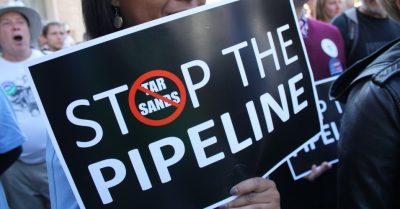In Another Blow to Keystone XL, Judge Rules TransCanada Can’t Conduct Pre-Construction Work
Indigenous and environmental groups as well as locals landowners celebrated the court victory, denouncing the proposed tar sands pipeline as "reckless and risky."

Opponents of TransCanada’s Keystone XL pipeline—from indigenous and environmental groups to local farmers and ranchers—celebrated a win in court after a federal judge ruled on Friday that the fossil fuel giant cannot conduct pre-construction work on the pipeline until the full environmental review ordered last month is complete.’
“Somehow TransCanada still hasn’t gotten the message that Keystone XL is a lost cause,” observed Sierra Club senior attorney Doug Hayes. “We’ve held off construction of this dirty tar sands pipeline for a decade because it would be a bad deal for the American people, and [Friday’s] ruling is yet another reminder that it will never be built.”
The ruling (pdf) from U.S. District Court Judge Brian Morris of Great Falls, Montana followed a November decision which found that the Trump administration ignored “prior factual findings related to climate change” and relied on “outdated information” regarding Keystone XL’s threat to endangered species, tribal lands, and regional water resources when issuing a permit for the pipeline.
In a move denounced as “corporate bulling at its worst” by Friends of the Earth legal director Marcie Keever, TransCanada had sought permission to conduct pre-construction work. Morris ruled that Calgary-based company may continue activities such as security efforts and conducting surveys needed to revise the environmental review, but barred all field activities along the proposed route.
Good news! A federal judge reaffirmed today that TransCanada cannot conduct any pre-construction field activities on its proposed Keystone XL pipeline. This ruling means that construction on the Keystone XL pipeline will continue to be delayed.
Read: https://t.co/SqoBP9ZDnK pic.twitter.com/yxoNCv59ZG
— Center for Bio Div (@CenterForBioDiv) December 8, 2018
“Farmers and ranchers thank the judge for seeing through TransCanada’s transparent power grab,” added Bold Alliance president Jane Kleeb. “We want our property rights and water protected, yet all the Trump administration cares about is aiding a foreign oil corporation.”
Calling the judge’s latest decision “one more victory for the rule of law over this reckless and risky project,” Natural Resource Defense Council senior attorney Jackie Prange said:
“Keystone XL cannot be built unless and until the Trump administration complies with the law. So far, we’ve seen no indication that it plans to do so.”
Jared Margolis, a senior attorney at the Center for Biological Diversity, agreed—concluding that “if the Trump administration takes an honest look at Keystone XL’s impacts, it won’t be able to justify this horrible climate-killing project.”
Critics of the Keystone XL continue to battle it in court and on the ground by organizing protests, installing solar panels along the proposed path, and returning land to local tribes in hopes of blocking the hotly contested project.
Bill McKibben, co-founder of 350.org, turned to Twitter after the ruling to thanks those who have continued the fight against the project:
Month after month, year after year, good lawyers help make sure Keystone Pipeline doesn't get built. Another win today–many thanks @CenterForBioDiv @BoldNebraska @SierraClub @NRDC @foe_us https://t.co/YnZGMCvB0M
— Bill McKibben (@billmckibben) December 8, 2018
*
This work is licensed under a Creative Commons Attribution-Share Alike 3.0 License
Note to readers: please click the share buttons above. Forward this article to your email lists. Crosspost on your blog site, internet forums. etc.
Featured image: Opponents of the Keystone XL pipeline have succeeded in blocking construction on the tar sands project for the past decade. (Photo: Elvert Barnes/Flickr/cc)

